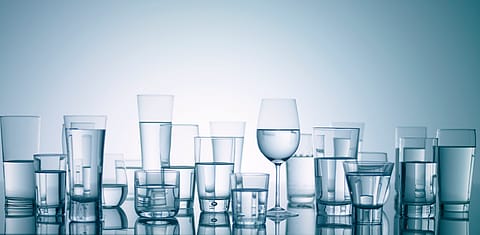Will local production pay off for Borosil?
Borosil's move to set up a borosilicate furnace reflects broader industry dynamics, as companies across sectors are pivoting to meet growing consumer demand.

Post-Covid, one thing is clear: consumers are vying for healthier and sustainable alternatives across product categories. This shift has been particularly evident in the glassware sector, where glass is emerging as a preferred substitute for plastic due to health and environmental concerns. This trend has not gone unnoticed by industry players like Borosil, one of India's leading glassware manufacturers, who are betting on this change by establishing the country’s first borosilicate glass furnace. But Borosil's move reflects broader industry dynamics, as companies across sectors are pivoting to meet growing consumer demand for sustainable products while navigating the complexities of local production.
“We sensed a big increase in demand for glass as a direct substitute for plastic, primarily driven by health concerns,” says Shreevar Kheruka, managing director of Borosil. The nearly ₹200 crore furnace, which became operational in March 2024, is a response to this growing consumer awareness. The company plans to produce 25 tonnes of borosilicate glass pressware per day. Glass, while heavier than plastic, offers advantages such as microwave safety and the absence of lingering odour from previous food, making it an increasingly attractive option for consumers seeking healthier lifestyles.
“People are asking for non-plastic alternatives, and that's a trend we've observed solidifying year after year,” says Kheruka. This shift in consumer preferences is a primary reason behind the Kheruka-family promoted Borosil group's decision to invest in the new glass furnace in Jaipur.
Setting up domestic production has been a significant investment for Borosil, costing around ₹200 crore. While importing glassware from Europe and China had earlier been a cost-effective solution, the company sees long-term benefits in local production. “When we are doing our own production, we get leverage in product development. We are no longer constrained by suppliers' shapes and sizes. This has allowed us to expand our product portfolio,” explains Kheruka. However, this has come at a higher cost, as the company now competes with cheap Chinese imports. Despite the initial losses, the company expects that over time, the increased product range and brand growth will help recover these expenses.
However, the move towards domestic manufacturing isn’t purely driven by internal strategy. External factors such as geopolitical tensions and the rising costs of importing from China have also played a role. “After Covid, geopolitical risks and the reliance on imports, especially from China, became a significant concern,” he admits. While volatile shipping costs were a temporary issue, long-term factors like supply chain stability prompted the company to act.
Market behaviour
India’s price-sensitive market presents a significant challenge for all major industries but more so for Borosil as glass products often cost significantly more than their plastic counterparts. “A simple plastic container or bottle would cost one-fourth or one-fifth of what an equivalent glass or steel bottle will cost. So, the entry-level products in rural areas work much better, and it will take time as per capita income picks up,” says Kheruka.
Recommended Stories
Borosil's strategic outlook hinges on income growth. "What I’ve seen in other geographies is that when the per capita income hits $5,000-$6,000 per year, that’s when people start investing in more design-focused and better-looking products," he says. Currently, India’s overall per capita income hovers around $3,000, with stark contrasts between urban and rural areas. Cities are at $6,000-$7,000, while rural areas remain around $1,500. “We’re still far from that $6,000 mark in rural India where lifestyle goods demand really starts to take off. But we are seeing unexpected patterns—randomly, we get large orders from villages we’ve never heard of, directly on our website,” adds Kheruka.
Another one of the key trends in the last couple of years is the rise of quick commerce platforms where customers make purchases for last-minute needs. “The perception was that quick commerce would be limited to groceries or consumable products, but we’ve noticed that people are ordering glassware, lunchboxes, and appliances,” shares Kheruka.
While demand for glass products has been growing, Borosil’s success has not been uniform across India. As per Kheruka, regions like North and East India have a higher penetration of glassware, while South India remains heavily reliant on steel. “North India, as a culture, is more look-focused, with people willing to try new designs and concepts. In the South, the steel-heavy culture has been slower to adopt glass, though we do see exceptions, particularly in Kerala,” he adds.
Riding a revenue growth rate of 15-20% in the short-medium term, Borosil Ltd revenues reached approximately ₹950 crore in FY23-24 while projecting revenues around ₹1,100 crore this year. Kheruka outlines a broader goal for the company, “We aim to double our revenues every four years, at least for the next few years.” EBITDA margins stand at 15-16%, indicating healthy profitability amid its expansion efforts. Borosil’s group turnover of all three companies - Borosil Ltd, Borosil Renewables Ltd, and Borosil Technologies Ltd - is expected to touch ₹3,500 crore in FY25 and likely to touch ₹7,000 crore in the next four years. That would mean a growth of almost 3.5-4x.
(INR CR)
Moreover, in order to satisfy demand, the group also aims to invest ₹250 crore in capacity augmentation and growth. Of this, around ₹150 crore will be spent on a new facility in Gujarat for Borosil Ltd.
While the immediate financial benefits of local manufacturing may take time to materialise, the company remains confident that its strategic investments will pay off in the long run.